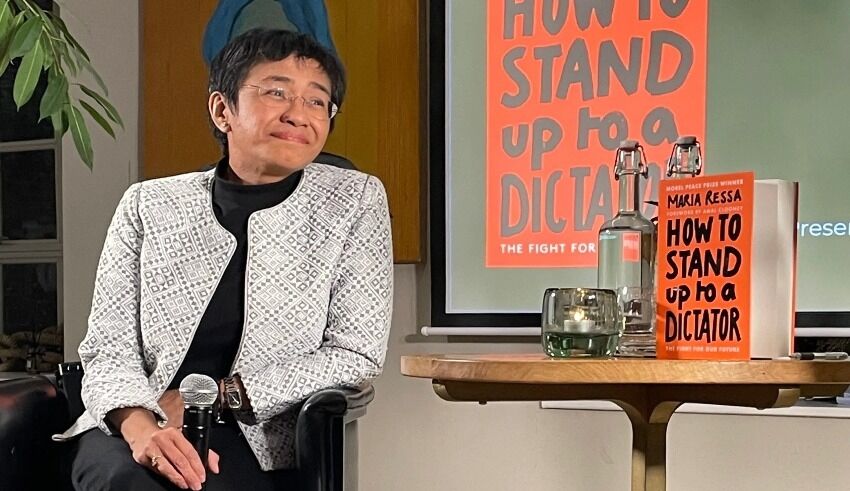
Maria Ressa, Nobel laureate and CEO of Rappler, presented her book How to Stand Up to a Dictator in the Philippines at the Estancia mall at Capitol Commons in Pasig City on Saturday, December 10, the International Day of Human Rights.
In attendance were former Supreme Court Justice Antonio Carpio, Karapatan Secretary General Cristina Palabay, economist Winnie Monsad, and architect Paulo Alcazaren. Tina Monzon-Palma, Howie Severino, and Karen Davila, journalists, were also there.
In a speech given at the book’s debut, the award-winning author Jose Dalisay hailed it as the finest nonfiction work of the year.
Dalisay stated, “We related with her tribulations, shared her indignation and anguish over the abuse she has endured, and cheered in her successes, whether in court or in the greater domain of public opinion.”
He said, “However, how well do we know Maria Ressa and what motivates her to be who she is? This book reveals the person behind the phenomena and provides answers to many concerns we may have had about her and her tenacious advocacy.”
In her book, Ressa fights and advocates for several causes, including exposing global networks of deception. By comparing the drug war of former Philippine president Rodrigo Duterte to Brexit in the United Kingdom, Russian and Chinese cyber-warfare, Facebook, and Silicon Valley – and how these ties to individuals’ own online presence and votes – Ressa emphasized that the first step in combating the dangers of social media was to recognize its flaws.
“By design, it is a lying machine,” Ressa stated during the introduction. “Today, our human attention and emotions are the commodity, and we are not protected. Do we choose to inhabit a society where deception is rewarded?”
After raising awareness, Ressa stated that the attention should shift to eliminating “coded prejudice” that further marginalizes groups such as women and people of color online. To build democracies, independent press “as the antidote to tyranny” was also required.
“Journalists are educated to challenge authority, and this is exactly what we require. “We must continue doing so,” stated Ressa.
Keep Reading
Part memoir, the novel also depicts Ressa’s career and the road she followed to get there by holding authority accountable.
But why use an intimate tone and disclose her personal tale, a tactic that journalists often avoid? The reason, according to Ressa, is that the fight for democracy has become personal.
“I remember when it got personal; it was when I was detained.” She stated, “I went from being a journalist to a citizen, and people should not be treated in this manner.”
Stories of Ressa’s move to the United States – and later, her return to the Philippines, the difficult decisions she made as a journalist covering Southeast Asia and as head of News and Current Affairs at ABS-CBN – provide an intimate look at not only the Nobel laureate’s life, but also Philippine journalism.
“One does not know who they are unless they are compelled to fight for it. How do you choose which causes to fight for? Sometimes you have no option. You live your way into it because the totality of your decisions leads you there,” Ressa stated.
How to Stand Up to a Dictator immerses readers in Ressa’s private reflections and the difficult dilemmas she faced while Rappler faced harassment and a barrage of legal challenges from the Duterte government.
At least seven active charges are underway against Maria, Rappler’s directors, and a former researcher as of December 2022, including a shutdown order launched by the previous Duterte government. As part of their efforts to restrict criticism and press freedom, Philippine media and international activists have cited the following.
Ressa’s book, hailed as “searing,” “important,” and “urgent,” was “authored by someone who never would take democracy for granted.”
As Ressa herself emphasized that day, “This moment is crucial. That’s it!”




